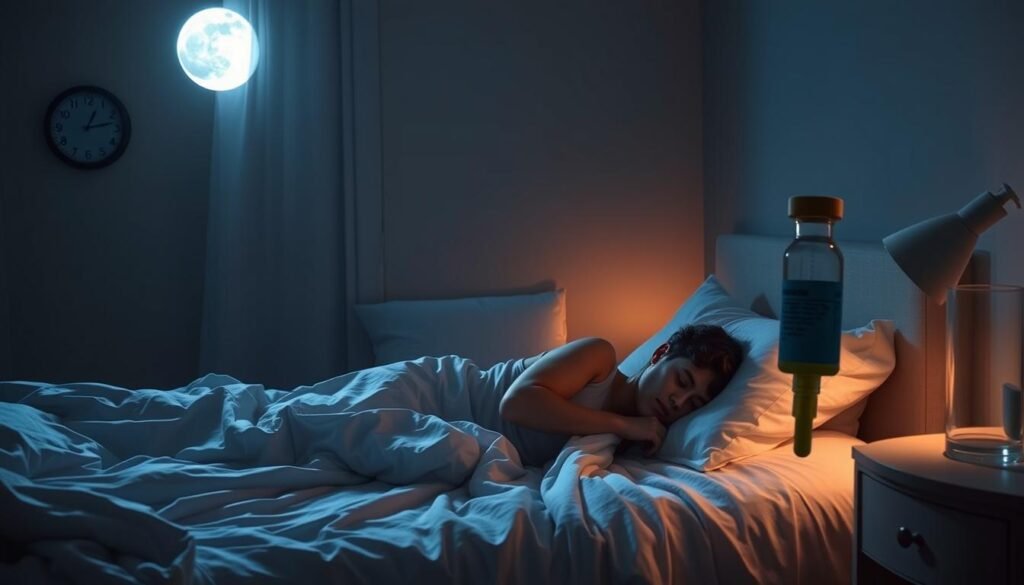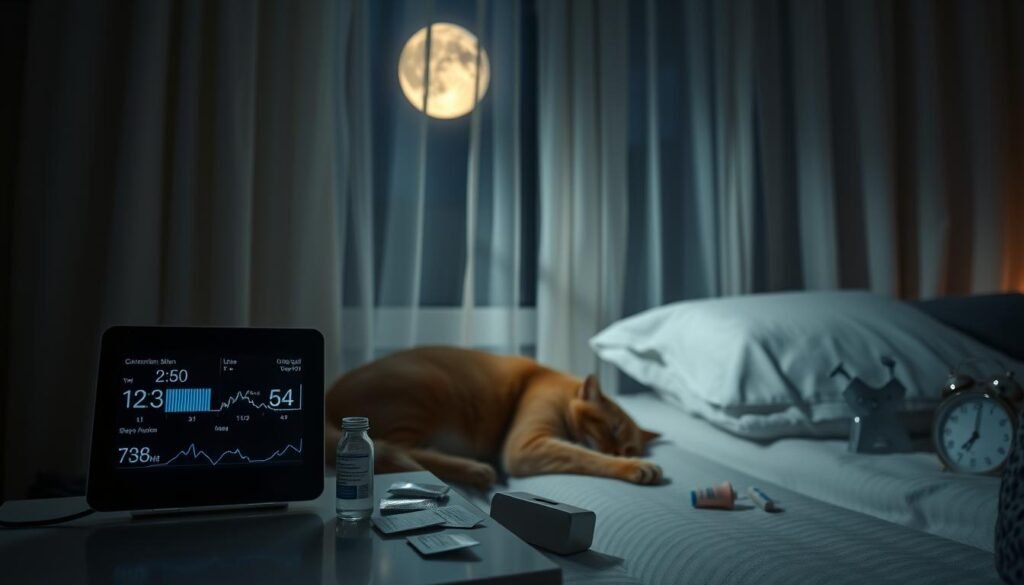Almost 20% of people say they have trouble sleeping after getting the COVID-19 vaccine. Since the CDC suggests vaccines for everyone 6 months old and up, there’s a lot of talk about side effects. This talk focuses on how vaccines might change sleep quality, not just cause pain and tiredness.
Adults need 7-9 hours of sleep every night to stay emotionally healthy. But, the COVID-19 vaccine may cause short-term sleep problems for some. While headaches and chills go away fast, the worry over the vaccine might stay. This worry could mess with how well you sleep.
This piece looks at how the COVID-19 vaccine and sleep troubles are connected. We’ll look at what research and stories from people tell us. Readers will learn how the vaccine might affect immunization and sleep. They’ll also find out ways to handle these problems.
Key Takeaways
- Vaccination against COVID-19 affects many, with a notable percentage reporting sleep disruptions.
- Common side effects may include tiredness, contributing to short-term sleep issues.
- Insomnia is not commonly reported as a side effect; however, its effects should be monitored.
- Psychological factors, such as vaccine anxiety, can play a significant role in sleep quality.
- Discussing persistent sleep issues with healthcare providers is essential for management.
Introduction to COVID-19 Vaccines
COVID-19 vaccines are key in fighting the pandemic. They include Moderna, Pfizer-BioNTech, and Johnson & Johnson, using different methods to boost immunity. Some need one shot, others need two. Their quick development and use show how vital they are in preventing serious illness and hospital stays from the virus.
Ensuring vaccine safety is crucial. Through trials and ongoing checks, we see they work well and have few side effects. As more people get vaccinated, the virus spread slows. This high success rate underscores their safety and power.
Vaccines do more than protect one person; they help everyone. As vaccination rates rise, the virus finds fewer hosts. This is key, especially for those who can’t be vaccinated for health reasons. Together, getting vaccinated brings us closer to normal life again.
| Type of Vaccine | Administration Method | Efficacy Rate |
|---|---|---|
| Moderna | Two doses | 94.1% |
| Pfizer-BioNTech | Two doses | 95% |
| Johnson & Johnson | Single dose | 66% (overall) |
Understanding Sleep Disorders
Sleep disorders mess with how well we sleep. Insomnia is a big one, making it hard to fall asleep or stay asleep. Now, 40% of people have sleep problems because of the pandemic.
These disorders can make us feel tired during the day. They lower our work performance. And they may lead to serious health issues.
Many who work on the front lines of the pandemic are losing sleep. Stress from work, money, and daily life is a big reason. Bad habits like more alcohol, caffeine, and too much screen time make it worse. Those with sleep apnea face extra risks if they get COVID-19.
About 20% of COVID-19 patients end up with long-term issues, including trouble sleeping. This isn’t just in people who were in the hospital. Around 52% of those with COVID-19 have sleep problems.
Understanding the link between sleep disorders, the pandemic, and recovery is important. If you want to dive deeper into how sleep and COVID-19 are connected, check out this study.
Vaccine Causes Insomnia: What Research Says
Studies have looked into how the COVID-19 vaccine might cause insomnia. Many have found that sleep problems, like insomnia or narcolepsy, are more common in those who’ve been vaccinated. One story showed a patient struggling with insomnia for months after getting their shot. This shows the challenges people face with sleep issues after the vaccine.
Case Studies Linking Vaccination and Insomnia
Case studies have found vaccine-related insomnia. One study saw 25 cases of insomnia out of 19,163 vaccine side effects. Teens, especially those who got the BNT162b2 vaccine, saw more sleep problems. The rate was twice as high. Different vaccines showed different rates of sleep issues. Adenoviral vector vaccines had a lot more cases than mRNA vaccines.
Insights from Recent Studies
Recent research looked at how vaccines affect sleep. A big study compared over 7,000 vaccinated people to about 2,200 who weren’t. Vaccinated folks had fewer signs of anxiety, insomnia, and depression. It seems vaccines might help reduce these symptoms. But, nearly 39% of healthcare workers said they had sleep problems. This is more than the rest of us. The study points out that vaccines might cause sleep issues both now and later on.
Common Side Effects of COVID-19 Vaccines
It’s important to know about the side effects of COVID-19 vaccines. People often report different reactions that can change their daily activities, like how well they sleep. These reactions are split into short-term effects and possible long-term ones.
Short-Term Reactions
Common short-term reactions to COVID-19 vaccines include:
- Soreness at the injection site
- Fever
- Fatigue
- Chills
These side effects from the COVID-19 vaccine are usually not severe. But they may make it hard to sleep well for a short time. Studies show people with these reactions might not sleep as long. They could also have a harder time falling asleep and staying asleep.
Long-Term Side Effects
While most short-term effects are mild, there are concerns about long-term side effects. These include serious conditions like Guillain-Barre syndrome and myocarditis. Some people who got vaccinated have more trouble sleeping than before. This shows why it’s important to keep track of your health after getting the vaccine. By understanding these issues, we can help those having trouble sleeping. This will also help us learn more about the vaccine’s safety over time.

Main Causes of Insomnia Related to Vaccination
The link between vaccination and sleep problems involves several factors. These include how our bodies fight off the vaccine and how we feel about getting vaccinated. Knowing about these factors helps us understand why some people have trouble sleeping after getting their shots.
Immune Response and Sleep Disruption
Vaccinations trigger an immune response that can mess with sleep. Our immune system uses energy when it fights off a vaccine. This can make us feel tired and disturb our sleep. Symptoms like soreness and feeling unwell after a vaccine add to the problem. Many people report not being able to sleep well after getting vaccinated. This is similar to those who have had COVID-19.
Anxiety and Stress Levels Post-Vaccination
Worrying about vaccines can make stress levels spike, which hurts sleep. Fears about side effects and whether the vaccine will work can increase nervousness. This makes sleeping problems like vaccine-related insomnia worse. The stress of the pandemic also adds to the mental burden, leading to more trouble with sleeping. Research shows many people struggle with sleep due to emotional and physical reactions after vaccination.
Impact of Vaccination on Sleep Quality
Vaccines affect sleep quality, especially around the time of getting shot. People who get less than six hours of sleep do not respond as well. This means the vaccine might not work as well against viruses, like COVID-19. Sleeping well after getting the flu shot results in higher antibody levels.
Studies show that not sleeping enough can affect how well vaccines work. This seems to be more so for men than women. Not sleeping enough before the Pfizer-BioNTech COVID-19 vaccine could lower your protection, similar to it waning after two months.
Not sleeping well might affect how the body responds to vaccines, not just for COVID-19 but for the flu too. People between 18 to 60 need good sleep for a strong immune response more than those over 65. This suggests we need more research to understand the effects of sleep, gender, and vaccines better.
Good sleep is important not just for vaccines but for overall health. It helps avoid problems like obesity, diabetes, and high blood pressure. Adults should aim for 7 to 8 hours of sleep a night to stay healthy, especially when getting vaccinated.

Lack of sleep can reduce a vaccine’s effectiveness, including against COVID-19. Knowing how vaccination effects and sleep quality interact helps people get ready for vaccinations and improve their immune response.
For more information on sleep and vaccine effectiveness, read the meta-analysis of the associations between insufficient sleep duration and antibody response.
Sleep Hygiene: Maintaining Healthy Sleep After Vaccination
Maintaining good sleep hygiene is vital for your recovery and well-being after getting a vaccine. By adopting specific sleep strategies, you can improve your sleep quality significantly. Having a consistent sleep routine is essential for better health, especially after a vaccine. Below, you’ll find effective ways to get better sleep. There’s also info on why sleep is important before getting vaccinated.
Techniques to Improve Sleep
- Establish a Regular Sleep Schedule: Make it a habit to go to bed and get up at the same time daily, even on weekends. Doing this helps your body’s internal clock stay on track.
- Create a Restful Environment: Make sure your bedroom is dark, quiet, and cool. You can use earplugs or an eye mask if necessary.
- Limit Screen Time: Try to cut down on screen time at least one hour before bed. The blue light from screens can make it hard to fall asleep.
- Engage in Relaxation Techniques: Add practices like meditation, deep breathing, or gentle yoga to your evening routine. These can help you relax before bed.
- Avoid Stimulants: Keep away from caffeine and nicotine before bedtime.
Importance of Sleep Before Vaccination
Sleep is crucial when getting ready for vaccination. Good sleep can boost the immune system’s response and make vaccines work better. Adults should get at least seven hours of sleep each night to stay healthy. Not getting enough sleep can cause health problems, like heart disease and metabolic issues. Getting enough good sleep can also lessen any negative side effects from vaccines. This helps you get back to health more smoothly after getting vaccinated.
Addressing Vaccine-Related Insomnia
Insomnia might pop up as a side effect after getting vaccinated. It can make daily life tough. You should talk to a doctor if this happens to you. They can help find the right insomnia treatment options for you. Finding the cause of sleep problems after a vaccine is key to getting better.
Consulting Healthcare Providers
Talking to a doctor is a smart first move for dealing with post-vaccine insomnia. They look at your health history to figure out why you can’t sleep. Then, they’ll suggest ways to help, like therapy or changes to your bedtime routine. It’s important to look at everything that could affect your sleep, even worries about the vaccine itself.
Treatment Options for Insomnia
There are many ways to treat insomnia, from pharmaceutical options to therapy. Pills might help short-term, but talking to a therapist could fix the problem for good. Using both medicine and therapy often works best. Talking openly with your doctor is key to making a good plan together.
To really understand how to get better sleep, check out insomnia treatment options online. There you’ll find tips on dealing with the worry that comes with sleep troubles. Honest talks with your doctor can lead to sleeping well again after your vaccine.
| Treatment Options | Description | Considerations |
|---|---|---|
| Medications | Prescription sedatives and over-the-counter aids | May lead to dependency; consult a doctor |
| CBT-I | Cognitive Behavioral Therapy specifically for insomnia | Long-term effectiveness with no side effects |
| Lifestyle Changes | Regular sleep schedule, limiting screen time | Requires commitment and consistency |

Does COVID-19 Affect Sleep Patterns?
The COVID-19 pandemic has made us all look closer at mental health and sleeping habits. Over 650 million have caught the virus by 2022, says the World Health Organization. Many of them have had trouble sleeping because of it.
About 52% of those with COVID-19 have had sleep issues during their sickness. Also, 26% of patients still couldn’t sleep well two weeks after leaving the hospital. Some folks even faced these problems for a month after getting better.
Nearly 80% of people dealing with long COVID also reported sleep troubles, insomnia being the most common. They found it harder to achieve deep, restful sleep compared to healthy people. Shockingly, over 40% of them had moderate to severe troubles sleeping.
Nightmares have also been more common for those with the virus. This effect can last for weeks or months after initially getting sick. It adds to the complex ways COVID-19 affects sleep.
About 2% start having insomnia between 14 and 90 days after getting COVID-19. Sleep issues, feeling very tired, and other brain-related symptoms like PTSD and anxiety may increase. These problems can disrupt normal sleep patterns and daily routines.
| Study Findings | Percentage |
|---|---|
| People reporting sleep disturbances during COVID infection | 52% |
| Hospitalized patients with insomnia post-discharge | 26% |
| Long COVID participants reporting sleep problems | 80% |
| Participants experiencing moderate to severe sleep disturbances | 40% |
| Individuals developing insomnia after COVID-19 | 2% |
Clearly, COVID-19’s long-term impact on sleep needs urgent attention. Knowing about these issues and tackling them early can help many get their sleep back on track.
Vaccine Safety and Public Health Considerations
Vaccine safety is key in public health plans. Health groups make sure vaccines are safe and work well before use. They look at how vaccines protect whole communities. This is especially important during events like the COVID-19 pandemic.
Research links good sleep to better vaccine results. People getting less than six hours of sleep may not respond as well to vaccines. A big review of 165 studies found that not enough sleep can lower your immune defense. Men were more affected than women in these findings. This shows how crucial sleep is for vaccine success.
Understanding vaccine risks and benefits is crucial. The Jynneos vaccine against mpox is very effective, showing a 78% success rate after one dose. However, it’s important not to ignore possible side effects. Trials for Pfizer-BioNTech and Moderna vaccines reported symptoms like headaches and Bell’s palsy. These can make people wary of vaccines.
Experts call for more research to understand how vaccines work. They want to know about both the health and social factors that can influence results. This helps create better health guidelines. It can reduce doubts about vaccines. And it helps everyone know more about the safety and benefits of vaccines.
Evidence-Based Recommendations for Better Sleep
Good sleep is key to your health, especially when getting vaccinated. Studies show sleeping less than six hours when vaccinated can lower your body’s defense. Adults need 7 to 9 hours of sleep each night for best health. Following proven tips can improve your sleep, especially when you’re getting vaccinated.
Keeping a regular sleep schedule helps. Going to bed and getting up at the same time each day improves rest. Having a quiet bedtime routine also helps you fall asleep better.
Studies show sleep affects how well vaccines work, especially in men. More research is needed for women. People who don’t sleep enough have weaker defenses after a COVID-19 vaccine. This looks similar to the natural decrease in vaccine protection two months after getting Pfizer or Moderna shots.
When you get vaccinated matters too. Getting shots in the morning might make them work better than in the afternoon. Planning your sleep and vaccine times could boost your immune system.
- Establish a consistent sleep schedule by going to bed and waking up at the same time each day.
- Implement a calming pre-sleep routine to signal the body that it is time to unwind.
- Aim for seven to nine hours of sleep, particularly around vaccination dates.
- Consider the timing of vaccinations to leverage potential benefits from optimal sleep patterns.
Using these tips for better sleep can also make vaccines more effective. This protects your health.
Conclusion
The link between COVID-19 vaccines and trouble sleeping is worth noting. Some studies show that more than half of the people vaccinated feel more sleepy. It tells us that while vaccines offer great protection, their side effects like sleep issues need our attention.
If you find sleeping hard after getting the vaccine, talk to a doctor. Knowing how vaccines affect sleep is key. This is because sleep problems are a common side effect. Reports show a small number of sleep issues with mRNA vaccines and more with adenoviral vector vaccines.
More research is needed on vaccines and sleep. Developing COVID-19 vaccines has been crucial in fighting the pandemic. But we also need to understand their full impact, including on sleep, for better patient care in the future.